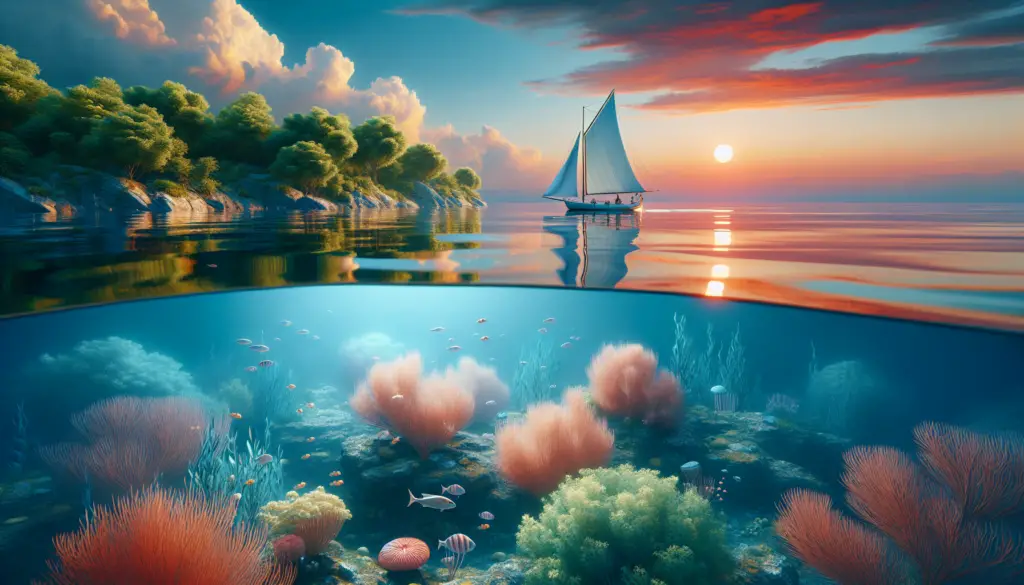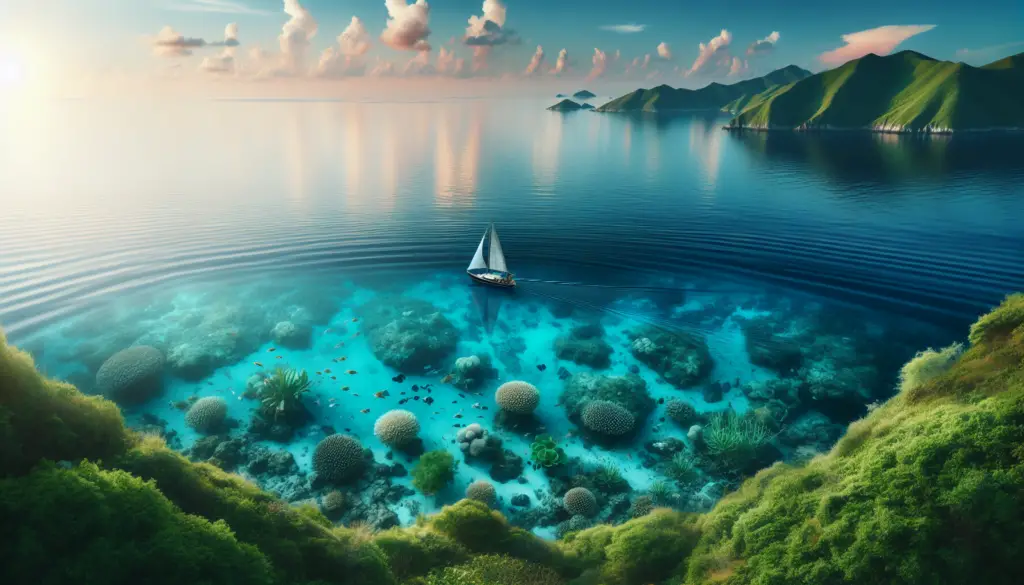As an avid boater, you relish the refreshing ocean breeze and the sense of serenity that comes with cruising through unspoilt blue horizons. Yet, with this invigorating pastime comes a responsibility – a responsibility to protect and sustain the very environment providing you with these priceless experiences. “Protecting Coastal Ecosystems While Boating” is a riveting piece that offers insightful revelations on the delicate balance between recreational boating and the preservation of coastal ecosystems. It sheds light on practical measures that you, as a boater, can implement to minimize your impact on these vulnerable habitats, promoting environmental sustainability while ensuring your boating adventures continue unhindered.

Understanding Coastal Ecosystems
Understanding and appreciating coastal ecosystems is vital as they play a crucial role in the planet’s natural balance. These areas, known as the interface of land and water, are rich in biodiversity and provide numerous beneficial services. Biologically active, bustling with marine life and plant species, they form a unique and essential component of our planet’s ecosystem.
The Importance of Coastal Ecosystems
Coastal ecosystems are integral to our daily lives. They serve as the natural barrier protecting the land from storms and the peril of rising sea levels. They are vital for marine life, providing habitats and feeding grounds to a wide variety of aquatic species. These regions are also economic engines supporting numerous sectors such as tourism, fishing, and recreation, contributing significantly to local and national economies.
Types of Coastal Ecosystems
Coastal ecosystems come in myriad vibrant forms. This includes coral reefs, salt marshes, mangrove forests, estuaries, and seagrass meadows. Each of these ecosystems is distinct, supporting a diversity of animals, plants, microbes, and invertebrates that interact, forming ecological communities teeming with life.
Threats to Coastal Ecosystems
Despite their importance, coastal ecosystems face numerous threats. Overfishing, pollution, climate change, habitat destruction, and invasive species are all significant challenges. Added to this list is the ever-growing recreational boating industry which, if not managed appropriately, can introduce additional stressors to these sensitive environments.
Impact of Boating on Coastal Ecosystems
the impact of boating on coastal ecosystems is multifaceted and sometimes overlooked. The effects can be physical, chemical, and acoustic, each bringing about unique challenges to these environments.
Physical Damage Caused by Boats
Boats can cause significant physical damage to coastal ecosystems. This includes propeller-scouring, anchor damage, and erosion caused by boat wakes. These activities can destroy the delicate seabed habitats, disrupt the feeding and breeding behavior of marine animals, and even lead to the death of organisms.
Chemical Pollution from Boats
Boats are known to release a variety of pollutants into the water. This can range from oil and fuel spills to biocides found in antifouling paints applied to boat hulls to deter organisms from colonizing. These chemicals can infiltrate the water, causing harm to aquatic life and disrupting the ecosystem’s balance.
Noise Pollution and Marine Life
Boat operations can create significant noise pollution underwater. This increased noise has the potential to interfere with marine life communication, navigation, and ability to find food, causing stress and harmful changes in behavior.
Eco-Friendly Boating Practices
One of the effective ways of minimizing the environmental impact of boating practices is through adopting eco-friendly habits. Being mindful about waste, pollution, and energy consumption can significantly reduce boating’s adverse effects on coastal ecosystems.
Using Non-toxic Cleaning Products
Choosing non-toxic cleaning products is a simple yet effective way of reducing boating’s impact on the environment. Biodegradable soaps, detergents, and cleaning agents are much less harmful to aquatic life than their toxic counterparts.
Proper Waste Disposal
Proper disposal of solid waste, sewage, and gray water generated on the boat helps prevent harmful substances and garbage from reaching the sea. Underscoring the importance of not dumping waste into the ocean is an essential step towards protecting coastal ecosystems.
Alternative Fuels and Boat Design
Using alternative fuels and embracing innovative boat designs can significantly reduce the environmental footprint of boating. Electric boats, biodiesel fuel, and hull designs that reduce fuel consumption are all effective ways to cut down on pollution and promote sustainability.

Navigational Care and Consideration
Responsible navigation plays a key role in maintaining the health of coastal ecosystems. Thoughtful maneuvers and practices can minimize physical harm and disruptions to sensitive marine habitats and species.
Avoiding Sensitive Areas
Boating away from sensitive areas such as coral reefs, seagrass meadows, and mangrove forests is crucial. Some regions can be particularly vulnerable to boat traffic, making it essential to keep a respectful distance.
Appropriate Anchoring Techniques
Using appropriate anchoring techniques can prevent damage to the seabed. Anchoring in designated spots, using proper anchor types, and avoiding sensitive seabed habitats are all effective strategies to prevent unnecessary damage.
Speed Regulations
Adhering to speed regulations in coastal waters is not just about safety, but also about reducing wake-generated erosion. High-speed boating can cause unnecessary disturbances to marine life and also contribute to shoreline erosion.
Sustainable Boating Equipment
Innovation and technology advancements have birthed an exciting range of sustainable boating equipment. Embracing these can aid in reducing the ecological impacts of boating.
Environmentally Friendly Anchors
Designed to minimize seafloor disturbances, eco-friendly anchors are essentially marine-friendly alternatives to traditional anchors. They are designed to gently grip the seafloor rather than plow through it, reducing anchoring impacts.
Eco-Friendly Hull Designs
Hull designs play a significant role in fuel efficiency. Eco-friendly hull designs help improve hydrodynamics, thus reducing fuel consumption and emissions. Certain antifouling coatings are also more eco-friendly, reducing the risk of toxic biocides being released into the water.
Solar-Powered Boat Components
Solar-powered boat components, such as solar panels for electricity generation and solar water heaters, can significantly reduce the reliance on fossil fuels. This not only contributes to lower carbon emissions but also aids in noise reduction.
Education and Awareness
Creating awareness and promoting eco-education among boaters is vital in protecting coastal ecosystems. By educating boaters about marine conservation, it instills respect for our natural resources and empowers them to make sustainable choices.
Boating and Environmental Education
Integrating environmental education into boating can instill the importance of sustainable practices amongst boat users. Such programs can cover topics like ocean litter, marine wildlife, and the effects of invasive species, offering practical advice on how to mitigate these issues.
Promoting Awareness about Coastal Ecosystems
Campaigns that spotlight the importance and vulnerability of coastal ecosystems can inspire a sense of stewardship among boaters. By understanding the value of these ecosystems, boaters are more likely to take steps to minimize their impact.
Community Outreach and Conservation
Involving boaters in community cleanup drives and conservation projects can boost their involvement and commitment to safeguarding coastal ecosystems. Participating in conservation actions not only expands understanding but also creates a hands-on connection with the environment.
Legislations and Policies on Boating
Regulations and laws about boating play essential roles in preserving coastal ecosystems’ health while ensuring safety and enjoyment for boaters.
International Marine Regulations
International marine regulations, such as the International Maritime Organization (IMO) standards, provide broad directives designed to minimize harmful emissions and manage wastewater. Compliance with such norms is an essential part of responsible boating.
National Regulations on Boating
National boating laws regulate aspects like speed limits, fishing zones, species protection, waste disposal, and boat maintenance. Abiding by these rules is crucial to protect our waterways and maritime biodiversity.
Local Laws and Bylaws to Protect the Coast
Local and regional regulations often address specific areas like popular boating destinations, marine parks, or protected areas. Thorough knowledge and adherence to these laws ensure that these particularly vulnerable ecosystems are adequately safeguarded.
Collaboration with Conservation Entities
Collaborating with conservation entities is a crucial aspect of promoting sustainable boating practices and protecting coastal ecosystems. There are many ways to collaborate, from cleanup drives to supporting marine protected areas.
Working with Conservation Organizations
Joining forces with conservation organizations can manifest in various ways: volunteering for cleanup events, sponsoring local conservation projects, or simply helping raise awareness about their initiatives. These collaborations often lead to positive environmental impacts.
Participation in Clean-up Drives
Cleanup drives are essential in keeping our coastal and marine ecosystems clean and healthy. Participating in these initiatives often leads to a greater sense of obligation to maintain and protect the environments we derive pleasure from.
Supporting Protected Marine Areas
Supporting marine protected areas (MPAs) can take the form of adhering to their guidelines, contributing financially, or helping raise awareness about their existence and importance. MPAs are crucial in protecting species and habitats, and our support ensures their continued success.
Role of Marine Reserves in Ecosystem Protection
Marine reserves play an essential role in coastal ecosystem protection. They can act as safe havens for marine life and serve as research and educational hubs.
Function of Marine Reserves
Marine reserves protect species, habitats, and natural features. They help conserve biodiversity, act as reference areas for scientific studies, and provide space for marine life to recover from human-induced pressures.
Boating in Marine Reserves
Responsible boating within marine reserves is crucial. Maintaining an appropriate distance from sensitive regions, following speed limits, and respecting local regulations can often help safeguard these protected areas.
Supporting Local Marine Reserves
Supporting marine reserves can come in different forms – from strictly observing the rules set by the reserves, making financial contributions, or spreading awareness about their importance. This ensures the sustenance and the success of these biodiversity hotspots.
Case studies: Success Stories in Conservation
There are numerous examples of successful conservation efforts in coastal ecosystems. These success stories offer hope and guidance in our pursuit of more sustainable boating practices.
Effective Boating Regulations
Law enforcement and educating the public about the importance of following boating regulations have significantly paid off in some areas, resulting in fewer instances of harmful boating activities and better-protected coastal habitats.
Community-Led Coastal Protection Initiatives
Several local communities have come together to protect their coastal ecosystems, leading to effective stewardship and maintenance of these valuable habitats. These sustainably managed regions are now green models leading the way to other communities.
Innovations in Eco-Friendly Boating
The boating industry’s shift towards environmentally friendly designs and technologies indicates a brighter future for our coastal ecosystems. Increased use of renewable energy sources, non-toxic materials, and efficient designs demonstrate that sustainable boating need not compromise the luxury and enjoyment that boating provides.
In conclusion, protecting coastal ecosystems while boating comes down to the collective will of individuals, communities, and organizations. By embracing Eco-Friendly Boating Practices, supporting conservation efforts, respecting rules, and promoting awareness, you can play a critical role in safeguarding these vital natural environments.


[…] boating communities are, basically, groups of boaters and marina operators who are dedicated to protecting and preserving the marine environment. As opposed to conventional boating practices, these communities engage in environmentally […]
[…] a boater, you carry a responsibility to preserve the delicate ecosystems that offer you so much joy and adventure. The article “Eco-Friendly Boating Practices in […]